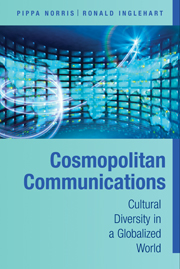Book contents
- Frontmatter
- Contents
- Tables and Figures
- Acknowledgments
- INTRODUCTION
- PART I FIREWALLS
- PART II CONSEQUENCES
- 6 Citizens: National and Cosmopolitan Identities
- 7 Consumers: Economic Values
- 8 Morality: Traditional Values, Sexuality, Gender Equality, and Religiosity
- 9 Activists: Civic Engagement
- CONCLUSIONS
- Technical Appendix A: Concepts and Measures
- Technical Appendix B: List of Countries
- Technical Appendix C: Methods and Multilevel Regression Models
- Notes
- Select Bibliography
- Index
- Titles in the Series
9 - Activists: Civic Engagement
Published online by Cambridge University Press: 05 June 2012
- Frontmatter
- Contents
- Tables and Figures
- Acknowledgments
- INTRODUCTION
- PART I FIREWALLS
- PART II CONSEQUENCES
- 6 Citizens: National and Cosmopolitan Identities
- 7 Consumers: Economic Values
- 8 Morality: Traditional Values, Sexuality, Gender Equality, and Religiosity
- 9 Activists: Civic Engagement
- CONCLUSIONS
- Technical Appendix A: Concepts and Measures
- Technical Appendix B: List of Countries
- Technical Appendix C: Methods and Multilevel Regression Models
- Notes
- Select Bibliography
- Index
- Titles in the Series
Summary
The logic of the cultural convergence thesis is that, in open societies, the flow of mass communication will gradually result in the spread of Western ideas about democratic practices and principles around the world. Information conveyed by international news agencies and transnational broadcasters – such as coverage of the American presidential election, images of monks protesting on the streets of Rangoon, or reports highlighting human rights abuses in Zimbabwe or the Democratic Republic of Congo – will thereby strengthen reform movements, grassroots activism, and public support for democratic values. At the same time, in closed societies where the news media are controlled by powerful governing elites, whether through state ownership of broadcasting, overt censorship, intimidation of independent journalists, or other mechanisms and where information from abroad is heavily filtered or restricted, mass communications can be expected to function as a mechanism of state control and propaganda. The impact of the news media on the process of democratization has attracted a great deal of research, but nevertheless many key questions remain unresolved. To examine these issues, in this chapter we first consider theoretical debates about the role of the news media in democracy and review the literature based on societal-level econometric studies and individual-level behavioral survey analysis of media users. Building on this foundation, we then examine evidence derived from the fifth wave of the World Values Survey concerning multiple dimensions of civic engagement, including institutional confidence, membership in voluntary associations, involvement in protest politics, citizen interest, support for democratic values, and evaluations of democratic performance.
- Type
- Chapter
- Information
- Cosmopolitan CommunicationsCultural Diversity in a Globalized World, pp. 236 - 258Publisher: Cambridge University PressPrint publication year: 2009



